Juneau County keeps healthy food program alive despite federal funding cuts
Businesses in one rural county in central Wisconsin are backfilling costs of a smaller Local Food Purchase Assistance program following funding cuts by the Trump administration — residents and farmers hope donations will sustain the health foods program in an area with few grocery stores.
Wisconsin Watch
September 22, 2025 • South Central Region
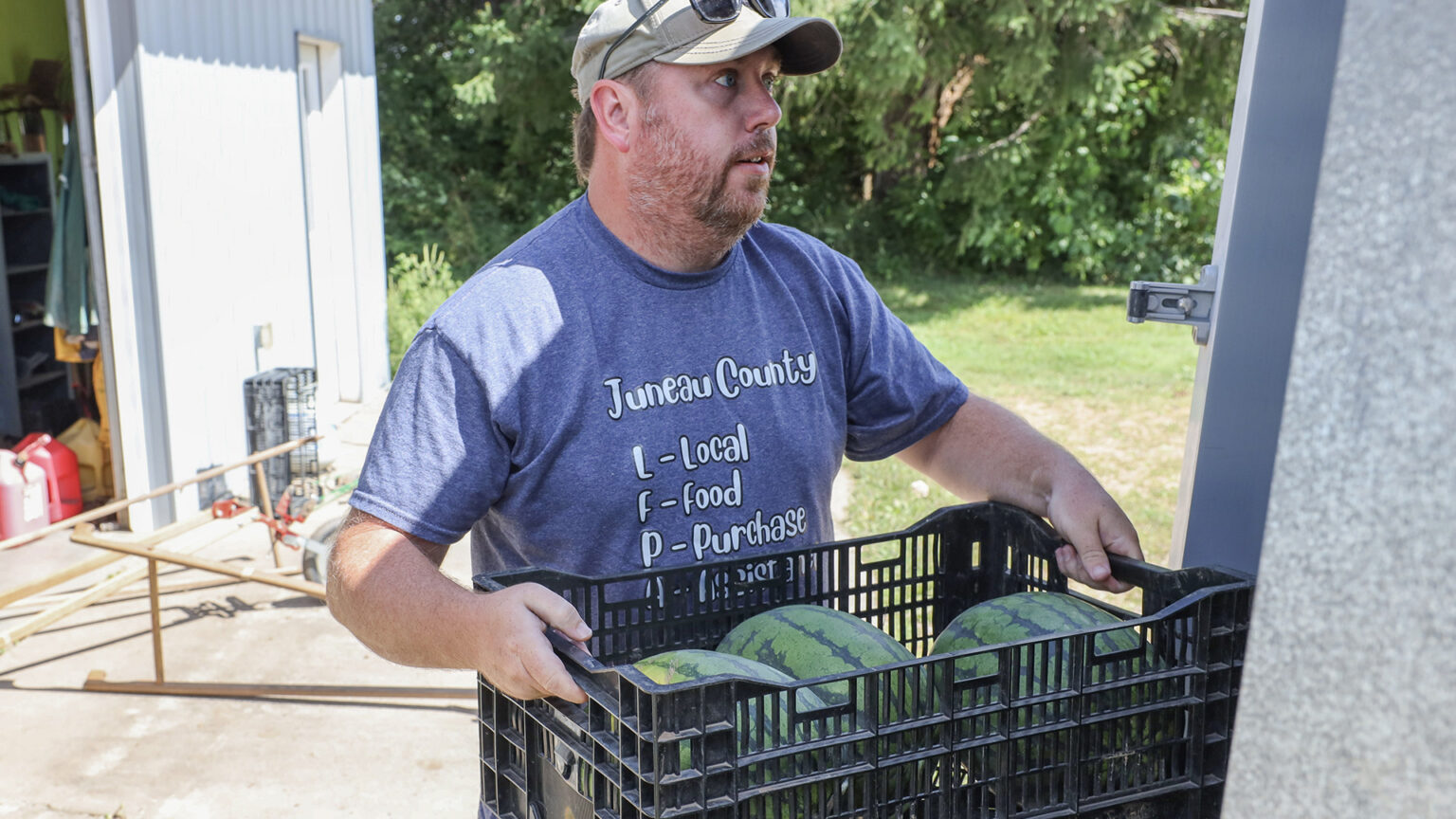
Dustin Ladd, Juneau County land and water conservation administrator, loads watermelons onto a refrigerated truck at Orange Cat Community Farm on Aug. 27, 2025, in Lyndon Station in central Wisconsin. The Local Food Purchase Assistance program allowed the county in 2024 to host more than 30 pop-ups with distributions of healthy foods. Cuts by the Trump administration have reduced that number to six, with local businesses backfilling funding. (Credit: Bennet Goldstein / Wisconsin Watch)

This story was produced and originally published by Wisconsin Watch, a nonprofit, nonpartisan newsroom.
On a Wednesday morning at about 11 a.m., Dustin Ladd turned the ignition on the county’s Ford pickup. He left the office with a humming, refrigerated trailer in tow and wound along country roads through central Wisconsin, stopping at farms to pack the vehicle with food.
Dustin handled nearly all the retrievals and deliveries last year, too. He isn’t one to say “no.”
“It takes me to all sorts of places — good or bad,” said Dustin, 36, who has worked as Juneau County’s land and water conservation administrator for six years.
The county partnered with more than a dozen local producers to host countywide pop-up distributions of healthy foodstuffs in the Central Sands — one of Wisconsin’s most food-insecure regions.
About one in seven county residents, often older and living on fixed incomes, struggles to make ends meet.
There are few grocery stores. Even so, many folks can’t afford to shop at the county’s only supermarket. A loaf of off-brand bread costs $2.79, a gallon of milk $3.39 and a dozen eggs $3.49.
Residents often turn to local gas stations or dollar stores, without the luxury of variety.
County employees saw a need. And an opportunity.
They obtained a grant in 2024 to run a food distribution initiative — known as the Local Food Purchase Assistance program, or LFPA — and anticipated continuing it in 2025.
The federal funding underlying the state program enabled the county to purchase food from more than a dozen area farmers, supporting the economy and residents in need.
But the newly elected Trump administration abruptly canceled the awards in March. Wisconsin would have received $5.5 million.
Additional cuts to the nation’s social safety net coincided with rising inflation that has pinched people’s pocketbooks and stretched food banks.
In 2025, Juneau County and local businesses backfilled the costs of running a significantly smaller program with just a fraction of the cash: six pop-up distributions. Not the previous 30-plus. Fewer nutritious meals fill stomachs, and the program’s future is unclear.
Still, a dedicated team of county staff, donors and volunteers is working to ensure residents obtain something.
They find joy in that.
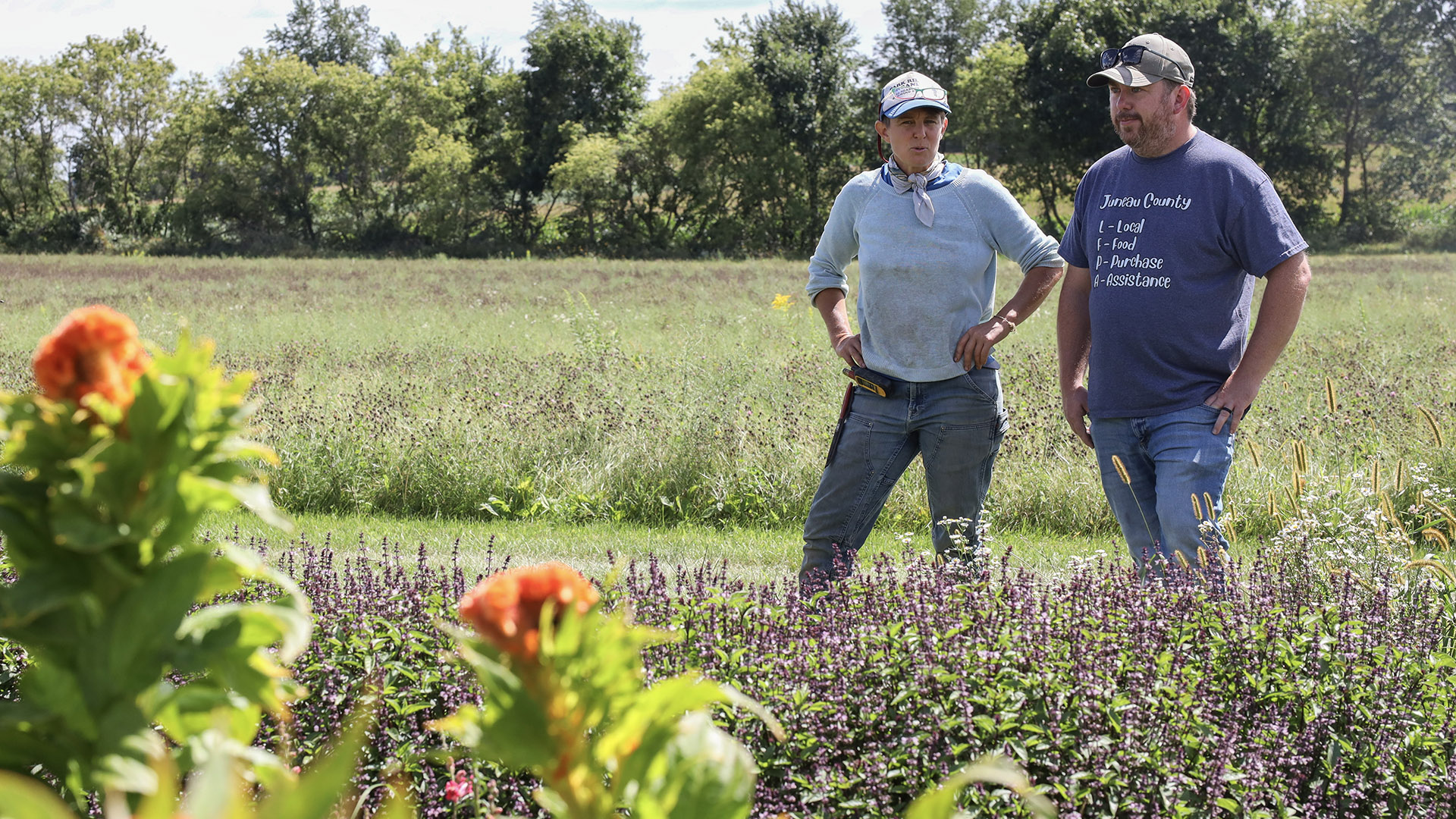
Laura Mortimore, owner of Orange Cat Community Farm in Lyndon Station, chats with Dustin Ladd, Juneau County land and water conservation administrator, while walking across the property on Aug. 27, 2025. (Credit: Bennet Goldstein / Wisconsin Watch)
Three felines roam the grounds at Orange Cat Community Farm south of the Juneau County border.
The youngsters are the unrelated successors of the farm’s namesake cat, Little Ann. Before she died, the cat kept her human, Laura Mortimore, company as Laura grew three acres of organic vegetables.
Feeding the community through Juneau County’s LFPA program in 2024 felt awesome, said Laura, 43. Nothing went to waste.
“I feel like I made a bunch of new friends,” she said. “I just wanted to keep going.”
Feeding the community through Juneau County’s LFPA program in 2024 felt awesome, said Laura, 43. Nothing went to waste.
“I feel like I made a bunch of new friends,” she said. “I just wanted to keep going.”
“But this is really great to keep, you know…” Laura said, pausing. “Moving forward in some way.”
Maybe the local farmers and county staff could have another LFPA committee meeting, she told Dustin. How about applying for some grants?
But as they seek donations, they have to compete with other good causes.
Dustin recently put in an application for $10,000 from the local electric utility. He pondered the unlikely possibility of starting a nonprofit to maximize the Juneau County program’s eligibility.
Will staff be able to run the program in 2026?
They’re going to keep trying.
- Laura Mortimore, owner of Orange Cat Community Farm in Lyndon Station, chats with Dustin Ladd, Juneau County land and water conservation administrator, while walking across the property on Aug. 27, 2025. (Credit: Bennet Goldstein / Wisconsin Watch)
- Dustin Ladd, Juneau County land and water conservation administrator, holds green tomatoes on Aug. 27, 2025. The produce was grown by Laura Mortimore, owner of Orange Cat Community Farm in Lyndon Station. (Credit: Bennet Goldstein / Wisconsin Watch)
To Dustin’s knowledge, Juneau County is the only local government in Wisconsin to oversee an LFPA program.
Staff and local producers ironed out the details the first year: crafting business plans, purchasing equipment, charting trucking routes, arranging shifts and building community trust.
Volunteers and employees from the county’s Aging and Disability Resource Center and Land and Water Department passed out food at village halls, parks and fairgrounds.
It’s not easy starting a new service.
“A lot of weeks of late Wednesday nights,” Dustin said.
Deer also preyed upon vegetables growing in farmers’ fields. Wild storms dropped hailstones across rows of sweet corn and apple orchards. One farmer lost about 200 pounds of ground beef when someone left a freezer door ajar.
But the trailer continued to visit all the major communities from May through January.
Sometimes, just 80 families came. Or as many as 200. Everyone left with something. Other than marking their township, age group and household size on a paper slip, no questions asked.
The county ultimately gave away about 4,500 food shares.
The only thing that’s still missing is the promised money to fuel the well-oiled machine.
Amid the polarized politics in Washington, there’s one glimmer of bipartisanship: the Strengthening Local Food Security Act, introduced in July by Sens. Jim Justice, R-West Virginia, and Jack Reed, D-Rhode Island.
The bill would allocate $200 million each year for states to pay farmers and fishers to sell goods to food providers and schools.
Reed called the new proposal a “win-win-win” for local producers, domestic supply chains and hunger relief agencies. He hopes to see the provisions included in the federal farm bill, which sets the nation’s agricultural policies and spending plan.
In Wisconsin, state lawmakers also set aside $10 million in the current two-year state budget for assistance groups to purchase Wisconsin-made foodstuffs.
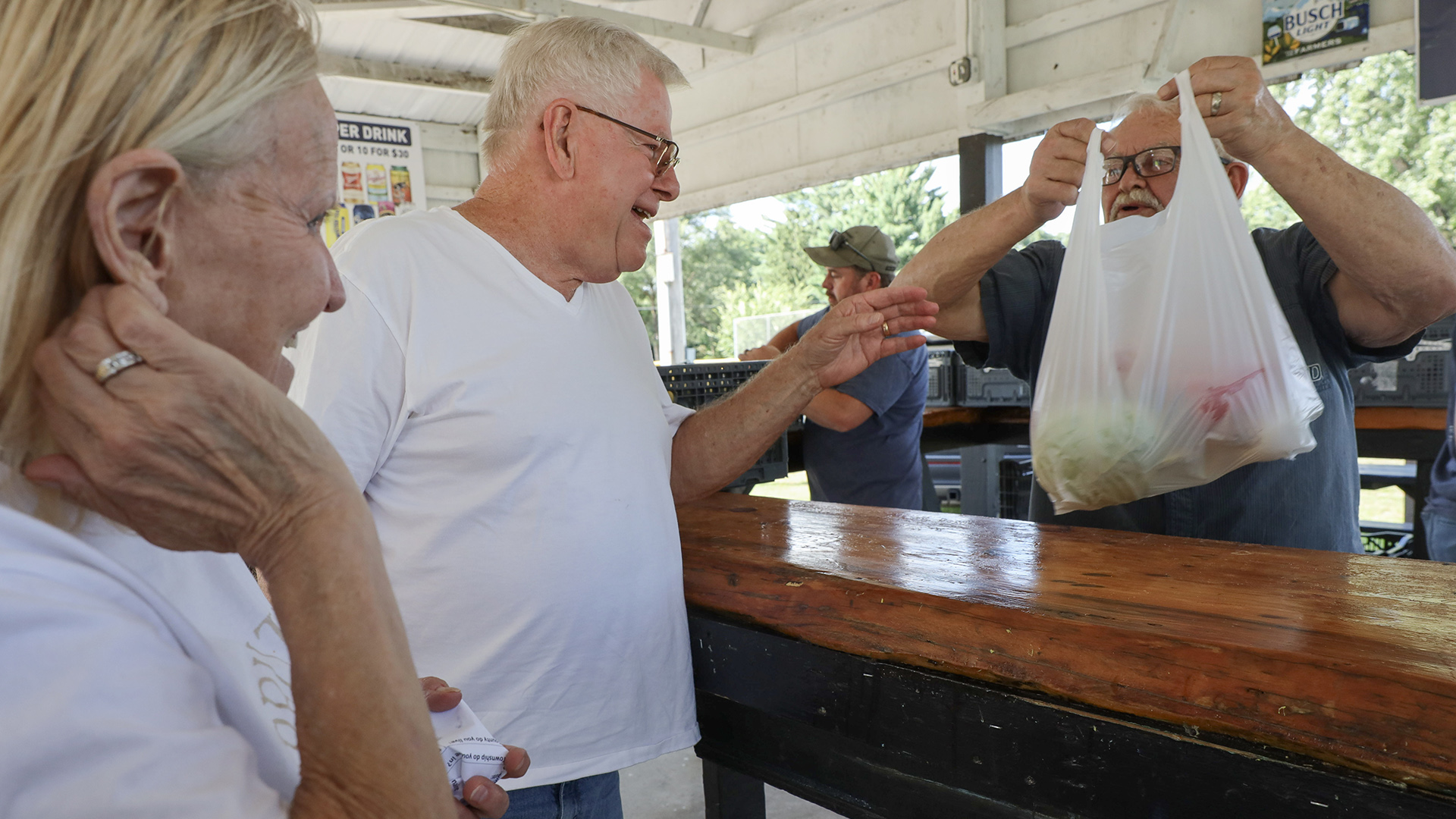
Dave Dearth, 77, of Mauston, collects a bag of fresh produce during a community pop-up food distribution event on Aug. 27, 2025, at Travis Fitzgerald Memorial Park in Lyndon Station, in central Wisconsin. Juneau County is holding six food giveaway events in 2025, supplied with fresh produce and meat from local farmers. (Credit: Bennet Goldstein / Wisconsin Watch)
At 3:15 p.m. Dustin rolled into Lyndon Station, a village of 500 residents. He headed to Travis Fitzgerald Memorial Park. Volunteers emptied the trailer and arranged the veggie totes atop impromptu serving tables under a picnic shelter.
Gina Laack, director of the Juneau County Aging and Disability Resource Center, dished out pumpkin bars and brownies as she welcomed arrivals.
The trickle of pedestrians turned into a stream, then a chattering crowd. Volunteers handed out registration forms and carried groceries to people’s cars, which now lined the street. More than 120 arrived that afternoon.
Some pushed walkers, others leaned on canes. A woman crinkled her face as she limped to the front of the line. Her sciatic nerves were acting up.
For many, the program expands the foods they can access. Produce straight from the field, better than a food pantry. Each pop-up brings blessings instead of tears.
“You have to remember this is a healthy food distribution,” Gina said, as she carved up the brownie trays.
Dave Dearth, 77, has been coming to nearly every pop-up since LFPA started in Juneau County. He heard about it through the ADRC, which also runs the Men’s Shed social club and dementia classes he attends with his wife, Anna.
“It’s nice to get some fresh vegetables,” he said through tinted eyeglasses. “Just something to look forward to. See people that you know.”
A retired counselor, Dave moved to the nearby city of Mauston to live close to his son. Dave picks up vegetables at the pop-ups he wouldn’t ordinarily buy. Growing up poor, he said, he learned to like eating everything.
Dave glanced at the bags of apples sitting atop the bar. Those don’t come cheap, he said.
Dave joined the line, and a volunteer handed him a sack loaded with a head of lettuce, a white onion, a red tomato, a green zucchini and a yellow squash. Another passed him a packet of ground beef.
Behind Dave, Anna adjusted her short blond hair and smiled.
By 4:30, the shelter hollowed out, but extra food remained.
Gina looped through the village — home to Mac’s Stumble Out Pub and the Swagger Inn — peeking into the local bars and grills. She beckoned people to the park.
“I will not have a beer at each of the bars!” she insisted as she left the shelter.
Seven minutes later, Gina returned with a train of locals — one dressed in denim overalls and a conductor’s hat.
He approached the serving line.
“Well, I’m hungry,” he said.
The LFPA crew swung into motion.
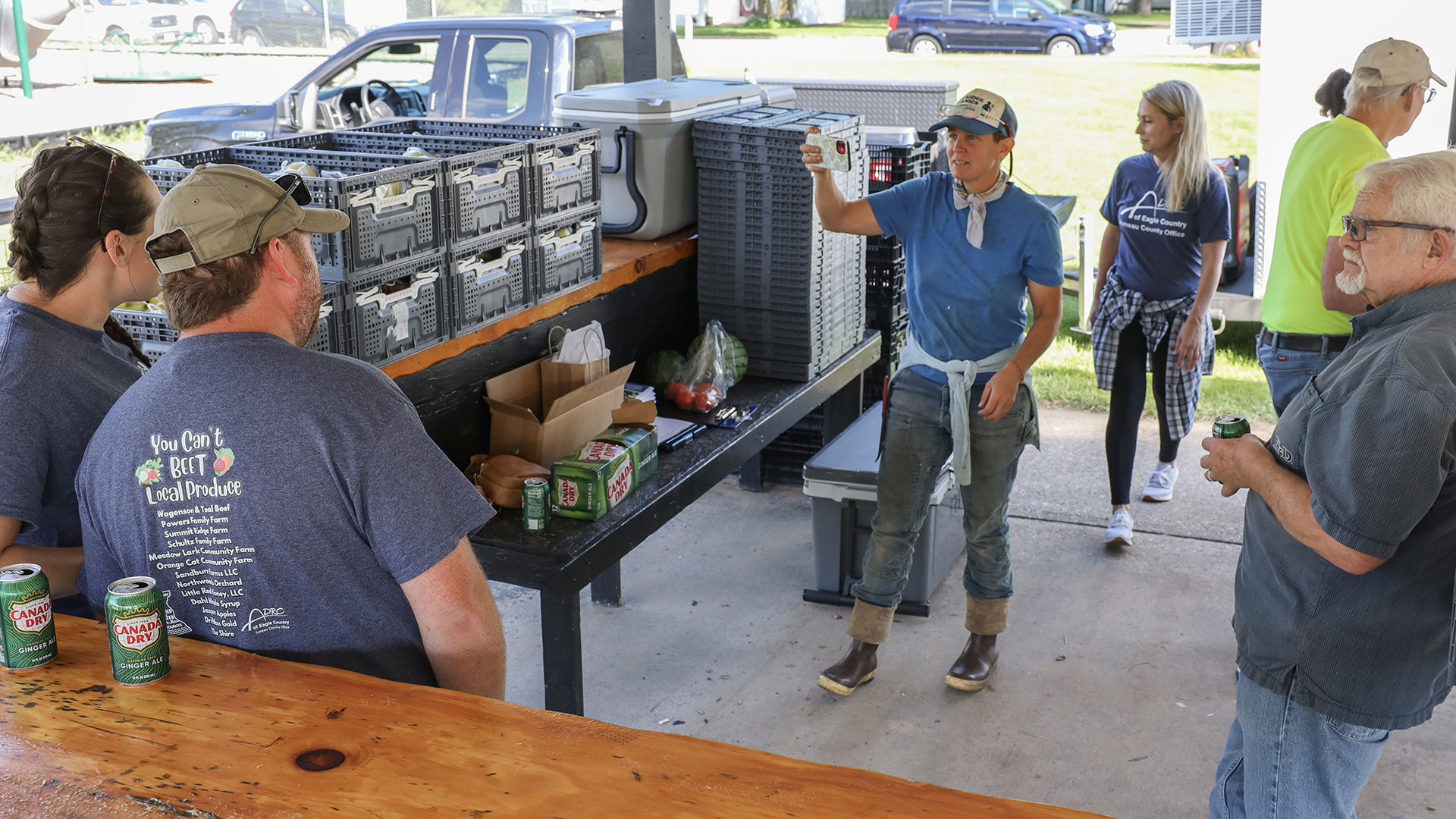
Volunteers and Juneau County employees mingle inside a park shelter following a community pop-up food distribution event on Aug. 27, 2025, at Travis Fitzgerald Memorial Park in Lyndon Station. (Credit: Bennet Goldstein / Wisconsin Watch)
Those wanting to donate to Juneau County’s Local Food Purchase Assistance program should contact the ADRC of Eagle Country Juneau County Office at (608) 847-9371 or [email protected]. They can also reach Juneau County Land and Water at 608.847.7221 ext. 3 or [email protected].
![]()
 Passport
Passport




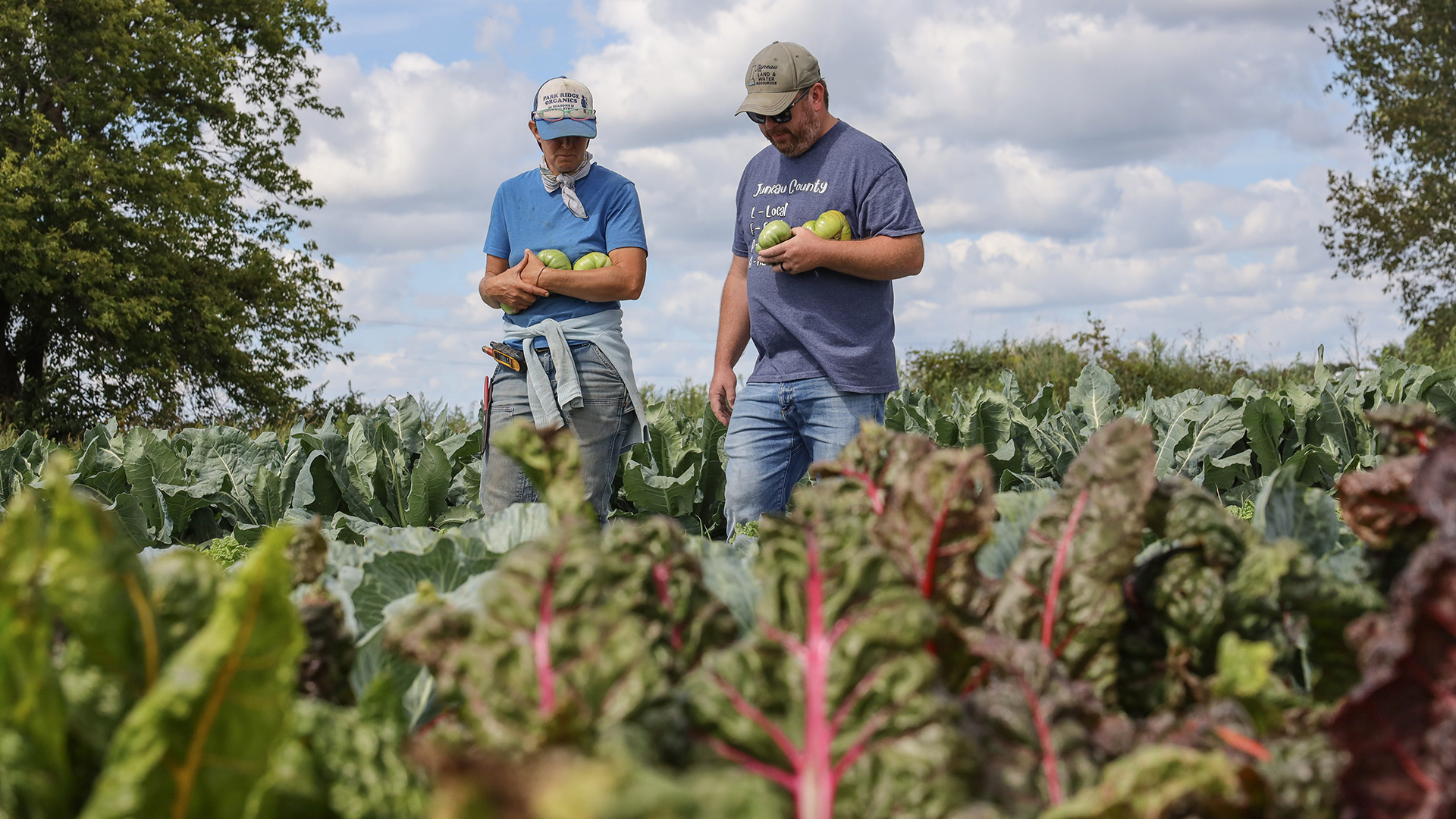
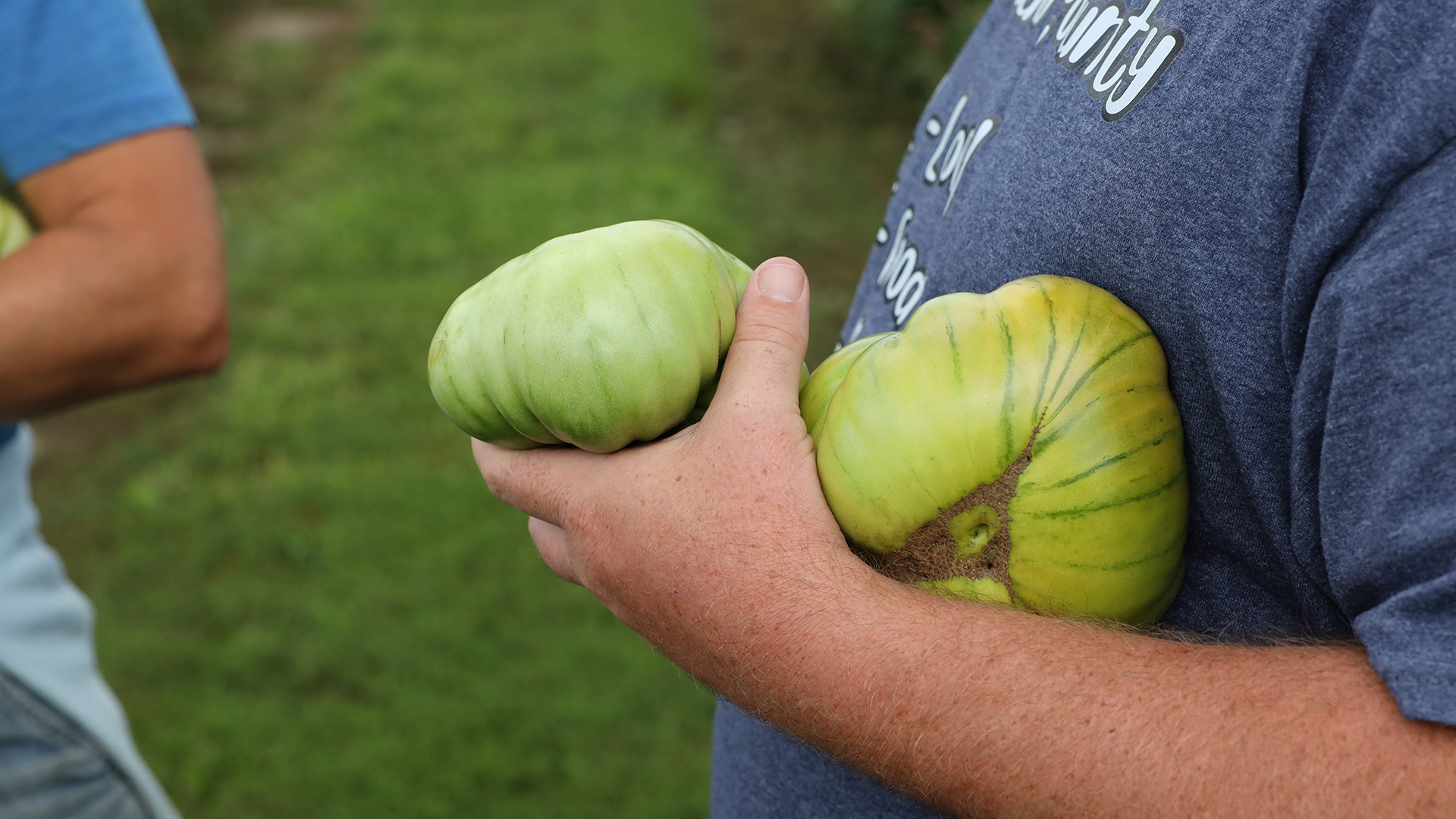
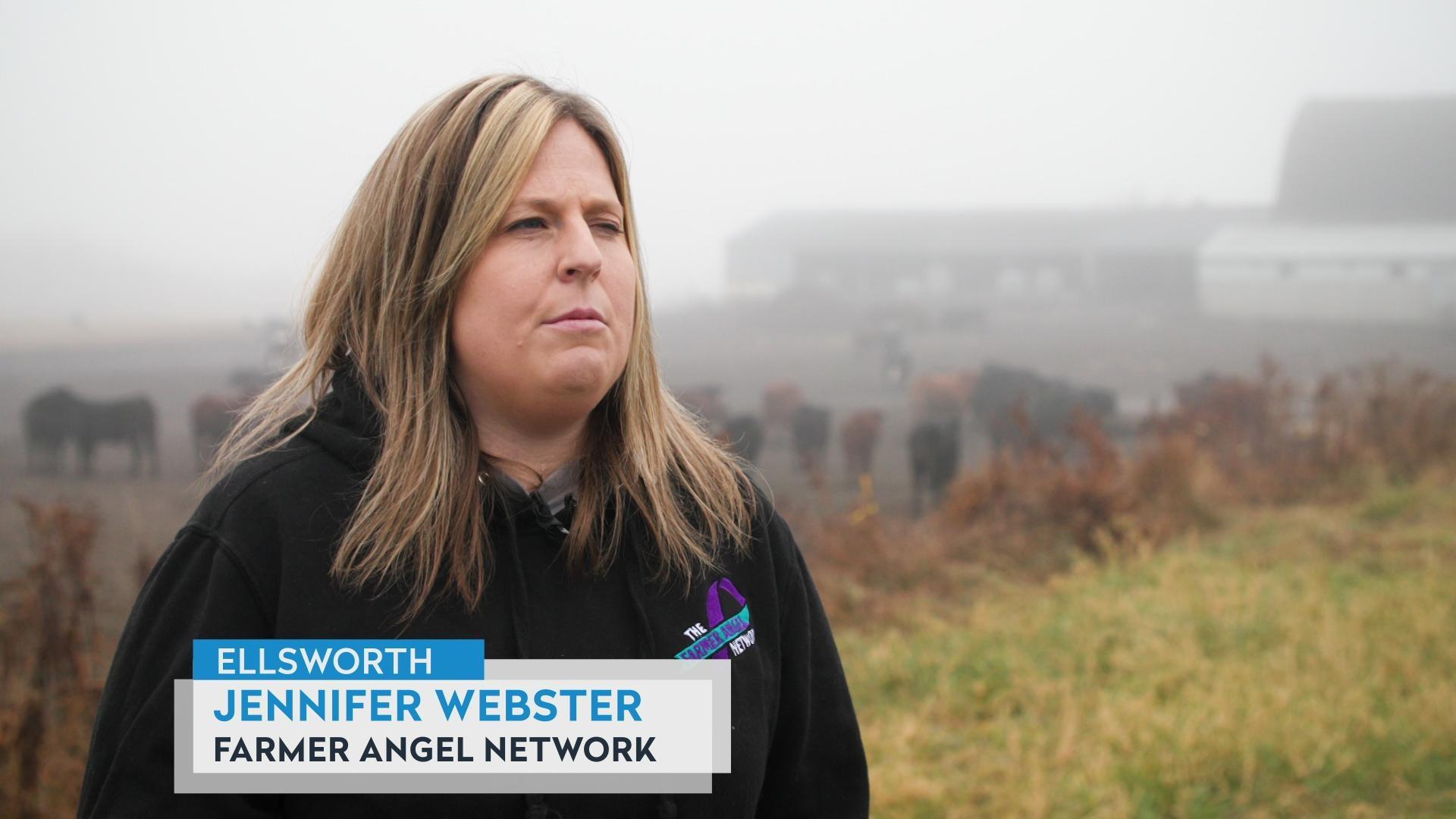
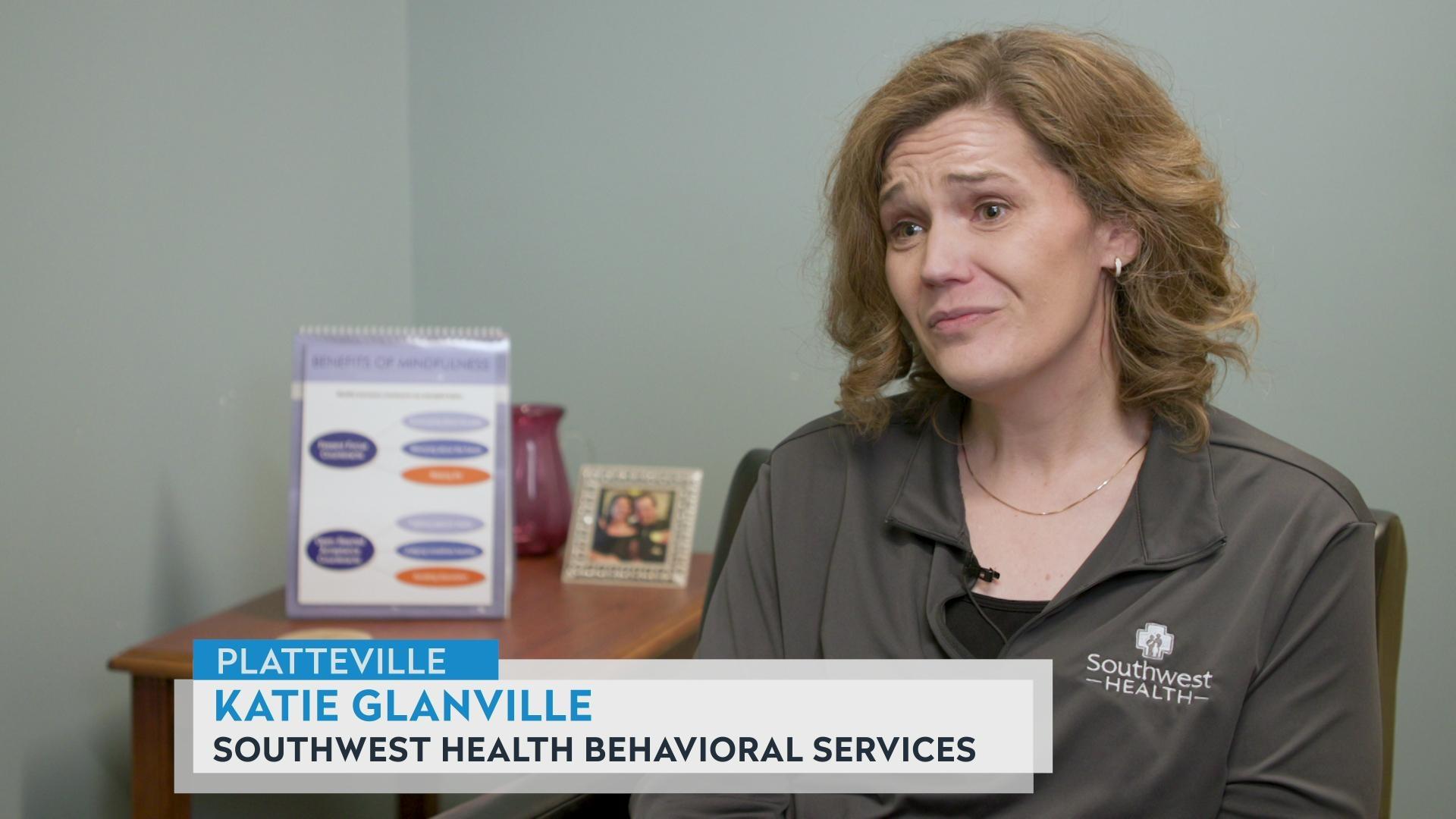

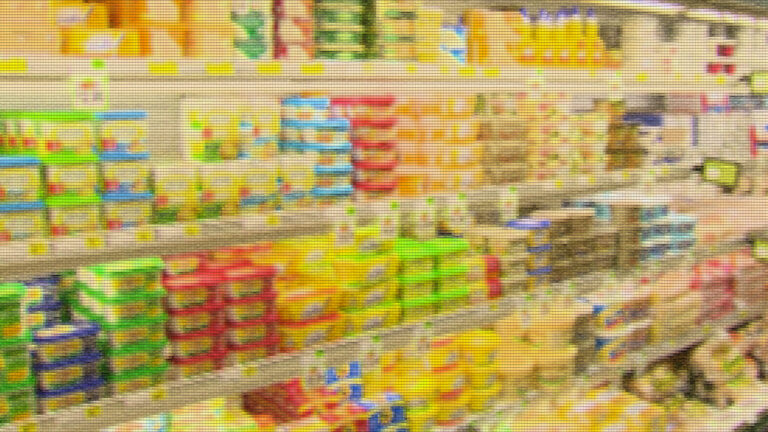
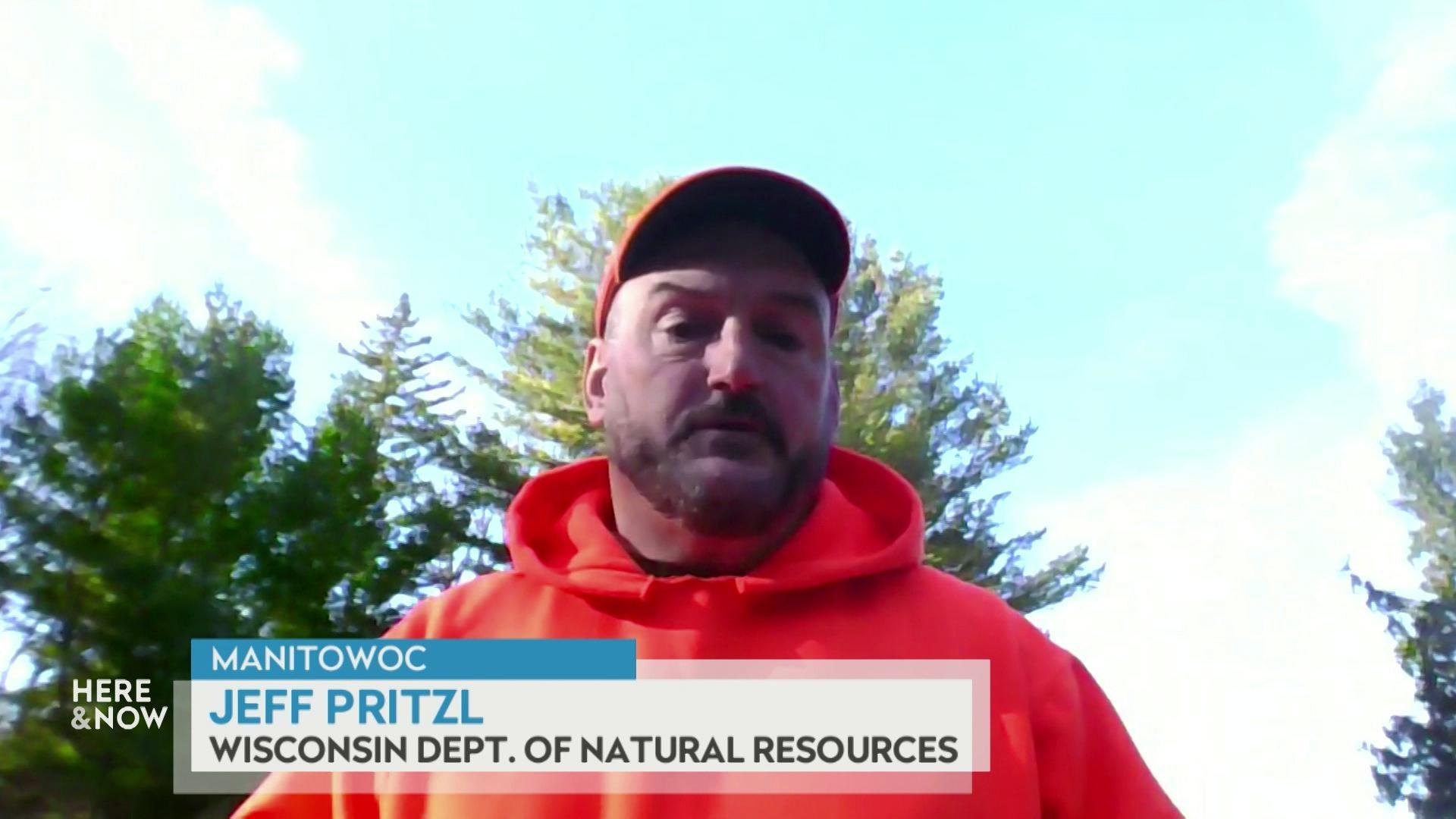
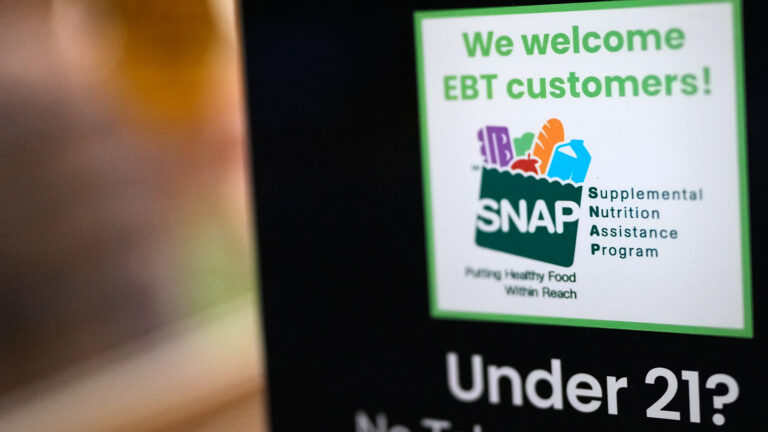

Follow Us